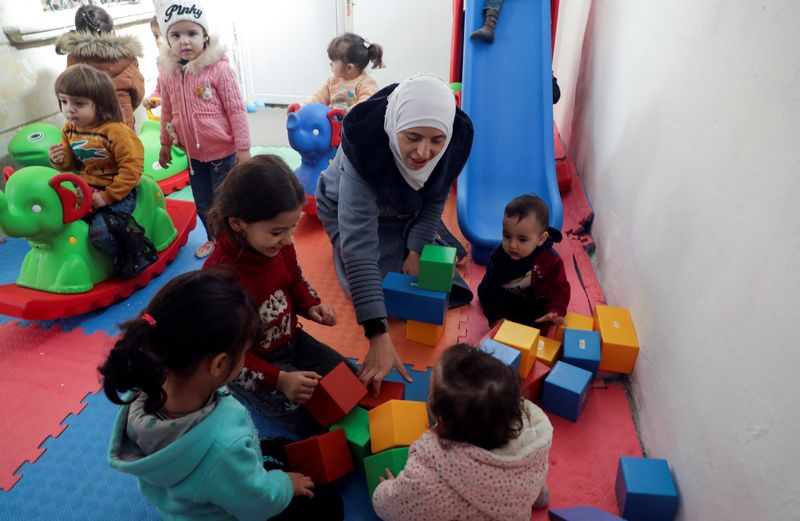(This Nov. 30 story has been refiled to fix a typo in the word 'impunity' in paragraph 11)
By Stephanie van den Berg, Anthony Deutsch and Maya Gebeily
THE HAGUE/BEIRUT (Reuters) - Illegal chemical weapons attacks killed and injured thousands during Syria's civil war, many of them children, but more than a decade later, the perpetrators go unpunished.
That could change under an initiative to create a new tribunal for such atrocities launched in The Hague on Thursday.
A dozen Syrian rights groups, international legal experts and others have quietly spent two years laying the groundwork for a new treaty-based court which could put on trial alleged users of banned toxic agents worldwide.
"The tribunal for us Syrians is hope," said Safaa Kamel, 35, a teacher from the Jobar suburb of Syria's capital Damascus, recalling the Aug. 21, 2013, sarin gas attack in the Ghouta district which killed more than 1,000 people, many in their sleep.
"The symptoms that we had were nausea, vomiting, yellowing of the face, some fainting. Even among the little ones. There was so much fear," she told Reuters from Afrin, a northwest Syrian town where she sought refuge. "We'll never be able to erase from our memories how they were all lined up."
Many diplomatic and expert meetings between states have been held to discuss the proposal, including the political, legal and funding feasibility, documents seen by Reuters showed.
Diplomats from at least 44 countries across all continents have been engaged in the discussions, some of them at ministerial level, said Ibrahim Olabi, a British-Syrian barrister, a key figure behind the initiative.
"While it's Syrians that are calling for it, for the use of chemical weapons in Syria, if states so wish, it could be far beyond Syria," Olabi told Reuters.
The Exceptional Chemical Weapons Tribunal proposal was launched on Nov. 30, the day victims of chemical attacks are remembered worldwide. The next step will be for states to agree on the wording of a treaty.
Three diplomats from countries in the global north and south told Reuters their governments were discussing the tribunal. They declined to be named as they were not authorized to speak on the matter.
"There is serious interest, deep interest, and recognition of the need for something like this – the need to address basically what is an impunity gap," one source said.
'SOME KIND OF JUSTICE'
The use of chemical weapons is banned under the Geneva Conventions that codified the laws of war. That ban was strengthened by the 1997 Chemical Weapons Convention, a non-proliferation treaty joined by 193 states which is overseen by the Organisation for the Prohibition of Chemical Weapons (OPCW).
But political division over the Syrian war at the OPCW and the United Nations led to the blocking of efforts to bring accountability for the widespread violations in international law in hundreds of suspected chemical attacks.
Syrian President Bashar al-Assad's government has denied using chemical weapons against its opponents in the civil war, which broke out in March 2011 and has now largely settled into a stalemate. Its information ministry did not respond to a Reuters request for comment.
Countries including France have opened prosecutions under so-called universal jurisdiction for war crimes, but in those situations where the International Criminal Court is not able to act there is no legal body that can prosecute individual suspects of chemical weapons use globally.
"Having those voices say 'we need some kind of justice ...I think that's going to be powerful," Dapo Akande, a British barrister and member of the United Nations International Law Commission, told Reuters.
There have been international courts for war crimes, from the Balkans to Rwanda and Lebanon, but none that focused on the specific crime of deploying chemical weapons, Akande said.
"It would be trying to fill a gap in the sense that it would essentially be for cases where the International Criminal Court is unable to exercise jurisdiction. And that would, I think, be particularly innovative about it."
The ICC, the world's permanent war crimes court in The Hague, has no jurisdiction in Syria.
The OPCW has the power to investigate claims of chemical weapons use and in some cases identify alleged perpetrators, but it has no prosecutorial powers. It said in January that Syria was responsible for an attack in Douma in 2018 that killed 43 people and censured Syria on Thursday for violating its obligations to declare and surrender banned toxic munitions.
A UN-OPCW Joint Investigative Mechanism (JIM) found that the Syrian government used the nerve agent sarin in an April 2017 attack and has repeatedly used chlorine as a weapon. It blamed Islamic State militants for mustard gas use.
Syria's ally Russia has repeatedly vetoed attempts to extend the JIM's mandate, which expired in November 2017.
TEN YEARS LATE
For Dr. Mohamad Salim Namour, who helped treat hundreds of patients after the 2013 Ghouta attack, the images of the choking and dying still bring him to tears. He recalled one child survivor lying among the bodies ask him: "Am I still alive?"
"We feel bitter that accountability is coming ten years late...We hope that we don't have to wait another 10 years," he told Reuters in The Hague.
"Let international law and justice take its course."
Only a tiny fraction of about 200 investigations into Syrian war crimes conducted by mostly European countries relate to chemical attacks, the U.N. body tasked with investigating Syria crimes, the International, Impartial and Independent Mechanism (IIIM) told Reuters.

IIIM head Catherine Marchi-Uhel said there are not enough justice opportunities for chemical weapons attacks in Syria and that her agency was ready to work with a new court.
"An international body with dedicated resources and a team that has developed expertise on building cases around chemical weapons incidents might be well placed to deal with these types of cases," she said.
